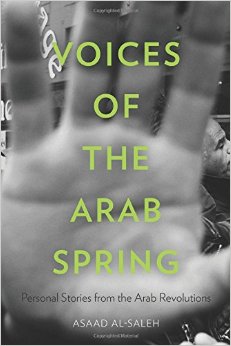Asaad Al-Saleh | (Informed Comment)
When I wrote my book, “Voices of the Arab Spring” (Columbia UP, 2015), I did not feature testimonials by children. Though the book surveys participants from various backgrounds—in age, politics, and education— – children were excluded for a proper reason. They should stay out of politics, though adults in the Middle East are hardly listening, especially where I come from: Syria. In the Middle East, and elsewhere, children have been used repeatedly to enhance various political stands—sometimes contradictory ones. During the bloodiest confrontations of the Arab Spring, between the Syrian regime and the hundreds of factions fighting it, children have become victims of the violence resulting from both the uprisings and the subsequent civil war. Despite this tragedy, children are still used in the rhetoric of revolt, war, and Jihad.
Reports and studies marking the fourth anniversary of the uprising and civil war in Syria show that more than 4 million people are refugees outside the country and 7.6 million are internally displaced, almost half of these are children whose need for assistance is only partially matched. Of the 200,000 killed in the 4 year span of the conflict, over 10,000 were children, some of whom died as a result of torture. Citing the international standards to identify the percentage civilians being targeted in war, which should not exceed 2%, reports on Syria point out that the percentage of targeted children and women reached 4.5 %. On the same occasion, the United Nations Children’s Fund (UNICEF) raised awareness about the emotional trauma affecting Syrian children, some of whom suffering from the effects of rape and the loss of parents. Labeling them as the “lost generation,” The UNICEF also reported that more than 20 percent of Syrian schools either destroyed taken as shelter by displaced families.
Also in Syria, children’s images are used as a participatory medium in the revolt and the war. For the regime of Bashar al-Assad, defending children has been the rhetoric it used to show that its enemies are abusing children while the regime is protecting them. In September 2013, the regime put on its public TV the 16-year-old girl named Rawan Qadah, who gave details about the alleged “Jihad sex” she was asked to perform upon the request of her father. The opposition immediately responded by stating that Rawan had been kidnapped, forced to tell the same lies the regime was spreading about its opponents, and appeared too young to be a “witness” verifying the regime’s claims. Rawan’s story demonstrates how children can be easily recruited for political agendas in areas of war.
For some revolutionaries, or those who revolted peacefully in Syria four years ago, it was inevitable to use children as they called for regime change and world attention to al-Assad’s crimes. This position draws from the assumption that children are “part of the revolution” and, therefore, their role must be presented. The world cares about children, and the situation in Syria was so desperate. Thus, children were used to provoke people’s emotions and turn more attention, political pressure, and eventually humanitarian or military intervention to “help” or “save” the children. Still not ethical.
As for the terrorists in Syria, children are considered the future of Islam, as envisioned by al-Qaeda or ISIS. Their participation in the terrorists’ agendas, most of which are symbolic but sometimes extremely graphic, is done without the least attention to legal, moral, or psychological issues. One of the early instances of using children’s images was done by Jabhat al-Nusra (The Support Front), an infamous affiliate of al-Qaeda. In June 2013, a video of a child, about 5 years old, was circulated by al-Nusra to celebrate their dogma. The child, who was carried on a man’s shoulder, was chanting a song full of bigotry and terrorism rhetoric:
Our leader is Bin Laden … O, you who terrorized America
We destroyed America …with a civilian airplane
The [World] Trade Center became a heap of sand
O, you Nusayri Police… wait for us O Alawites
We are coming to slaughter you … without any Convention
[The child is given a knife to pretend that he is killing someone, before continuing:]
They say I am a terrorist … it is my honor, I replied.
Our terrorism is praised …. a divine call
Children often play games fantasizing themselves as heroes with guns to fight the bad guys. But in Syria they are being dragged into real war zone, even as instigators. The image industry in Syria circulates hundreds of images belonging to children carrying conventional weapons or dressed in military costumes, and more recently playing with slaughtered heads as part of ISIS propaganda.
Such visibility is hardly the outcome of genuine consent of the child since he or she are not cognizant of their roles and the consequence of such participating functions. These children are growing up in one of the ugliest war zones in the Middle East. One day they will tell stories full of bad guys, including who let this war drags on and on.
Asaad Al-Saleh is Assistant Professor of Arabic Literature and Comparative Literary and Cultural Studies at the University of Utah and author of Voices of the Arab Spring



 © 2026 All Rights Reserved
© 2026 All Rights Reserved